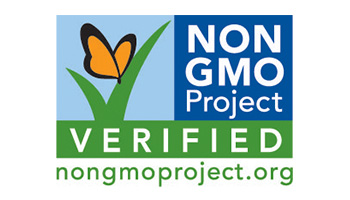One of the most dangerous and least understood experiments with human health the world has ever known is currently underway without your consent—in your household and households across the nation, indeed throughout our entire planet. It is the wholesale contamination of the world's food supply with genetically modified organisms (GMOs).
Government and the GMO industry say these new crops are environmentally safe and that there's no nutritional difference between GMOs and conventional crops. According to them we don't need to know, so no labeling is required.
This October, Down to Earth will join more than 1,500 grocery retailers across North America participating in the fifth annual Non-GMO Month. This month-long celebration puts a spotlight on a person’s right to choose food and products without genetically modified organisms (GMOs).
Why should we be concerned about GMOs? GMOs may pose health, safety, and other potential risks that far outweigh the purported benefits.
Health risks: No one is certain how these new gene combinations will behave long-term. Animal studies indicate serious health risks associated with GMO food, including infertility, immune problems, accelerated aging, faulty insulin regulation, and changes in major organs and the gastrointestinal system.
Environmental risks: Genetic engineering allows plants to survive high doses of weed killers, resulting in higher herbicide residues in our food. GMO crops are creating ‘super weeds’ and ‘super bugs,’ which can only be killed with ever more toxic poisons. Pollen drift from GMOs can contaminate nearby crops and wild plants through crossbreeding. Once released into the environment inadvertently, GMOs cannot be recalled.
GMOs are in 80% of the processed food on grocery store shelves—and a handful of whole foods as well, with perhaps more on the way soon.1,2
- Alfalfa (first planting 2011)
- Canola (approx. 90% of U.S. crop)
- Corn (approx. 88% of U.S. crop in 2011)
- Cotton (approx. 90% of U.S. crop in 2011)
- Papaya (most of Hawaiian crop; approximately 988 acres. Down to Earth sells only non-GMO papayas!)
- Soy (approx. 94% of U.S. crop in 2011)
- Sugar Beets (approx. 95% of U.S. crop in 2010)
- Zucchini and Yellow Summer Squash (approx. 25,000 acres)
Labeling is needed so consumers can make an informed choice.
Public concern about GMOs is rising as studies increasingly raise doubts about the long-term safety and environmental impact of this experimental technology. GMO labeling is mandatory in 64 countries around the world, including Australia, Russia, China, and all of Europe, but no such requirements exist in the U.S.
“We have the right to know what we’re eating and feeding our families,” says Mark Fergusson, Down to Earth Chief Organic Officer (CEO/CFO). “Foods containing GMO ingredients should be labeled," he says
The non-GMO category is one of the fastest growing sectors in grocery; with 80% of shoppers seeking out non-GMO products and 56% saying non-GMO was key to brand buying.3 This growing awareness is sparking major change in the industry: labeling ballot measures, food manufacturers refining ingredients; retailers announcing their non-GMO purchasing policies; and food service companies inquiring about verification. To date, over 22,000 products have been Non-GMO Project Verified, with annual sales of these products topping $7 billion.
The simple truth is that most people want the right to choose what they eat and what they feed their families. For consumers to make informed decisions, the public deserves a truthful marketplace. Watch the recent interview with KITV as Fergusson, speaks out about GMOs.
How can customers avoid food containing GMOs?
One of the ways to avoid GMOs is to choose foods that have the Organic seal, which certifies that GMOs were not used in production:
Another option is to look for the Non-GMO Project Verified Seal issued by the Non-GMO Project:4
Down to Earth’s Long-Term Goal is to be: All-Organic & GMO-Free
As we move towards our long-term goal to be all-organic and GMO-free, we give priority to organic and Non-GMO Project Verified products in our purchasing decisions, and are gradually eliminating products that contain GMOs. Unfortunately, we are unaware of any grocery store in the USA that can claim to be GMO-free, though we are hopeful that one day, many stores, including Down to Earth, will be able to make that claim. Toward this end, we:
- Avoid purchasing any new food products that may contain GMOs
- Do not sell single ingredient GMO foods (including papaya, corn, soy, canola or sugar produced from GMO sugar beets)
- Encourage our suppliers to become Non-GMO Project Verified
- Require that by 2018 all products sold in our stores containing GMO ingredients be labeled
- Actively support organic and sustainable farming methods
- Advocate for the consumer’s “right-to- know,” including labeling of products that contain GMOs
- Educate and communicate about the economic, social, health, and environmental impacts of GMOs
Few choices in our daily lives are as important as the food choices we make for ourselves and our families. We should be the ones in control, not government. It's wrong for government to deny us our right to know. Our right to know what is in the food we are buying and our right to choose our preferred food should not be usurped for any reason. For more information about GMOs visit the Label GMOs page of our website.
- JustLableIt
- Non-GMO Project
- 014 Market LOHAS (Lifestyle Of Health And Sustainability) Mambo Sprouts Marketing Annual Natural and Organic Consumer Research
- The Non-GMO Project (Accessed 12-9-11)
